CALIFICACIÓN DE IMDb
7.6/10
5.6 k
TU CALIFICACIÓN
Agrega una trama en tu idiomaWhen an aging activist is arrested, the lives of the accused, the lawyers, and the judge intertwine to reveal bigotry that underscores the judicial system.When an aging activist is arrested, the lives of the accused, the lawyers, and the judge intertwine to reveal bigotry that underscores the judicial system.When an aging activist is arrested, the lives of the accused, the lawyers, and the judge intertwine to reveal bigotry that underscores the judicial system.
- Dirección
- Guionista
- Elenco
- Premios
- 21 premios ganados y 10 nominaciones en total
Sukhdas Suryawanshi
- Sukhdev (court staff)
- (as Sukhdas Suryawamshi)
- Dirección
- Guionista
- Todo el elenco y el equipo
- Producción, taquilla y más en IMDbPro
Opiniones destacadas
If you're expecting a mainstream courtroom drama which would focus upon one case and move forward dramatically then you're badly misled. Court in fact is a unique portrayal of how the legal system works in India. It has showed the miscarriage of justice by focusing upon lives of the 4 main characters which heavily determines the outcome of the case they are involved in. As a layman not knowing legal system inside-out you would believe that lawyers are perfect and Judges are God-sent, impartial beings who would deliver justice no matter what, and theoretically that is how it is supposed to be. But this movie focuses upon how these people are as much human beings as you are and how their personal lives usually have direct or indirect impact upon the case and its outcome. Media usually ignores these issues because such undercurrents are usually unnoticeable and difficult to be proved and delivered to lay man. Secondly the movie has hired an outstanding cast. Not one character you would believe is a fanciful picture perfect character as portrayed in other mainstream movies but rather they have tried really hard to keep the characters as natural as possible which helps substantiate the story more convincingly. That is what I believe makes the movie stand out from the rest. Thirdly as many of you must have noticed the movie does take a slower pace than we're generally used to but I guess that is because the Director didn't intend to reach somewhere at the end of the movie (like a Judgement, or a climax). His focus was on the lives of the people and hence the movie tend to have taken that pace. Overall its a brilliant movie not complimenting the mainstream movies and I believe a movie with a message which is the need of the hour.
I loved this film for it's simple and real depiction of Indian courts.
This is as close as it can get in depicting how the Indian judicial courts deal cases. Please note that this film is not exactly about a particular case, but it was more so a comment on how the judicial system works in India. Although, a case was taken to represent the judicial procedures, I looked at this film as a showcase of the process in itself.
There is a lot of reflection of reality which is a rarity in Indian films. We have camouflaged films or those which in the name of depicting reality show us the perspective of makers. The best realistic film was "Black Friday" as per me and this comes the second best. Second only because it did not have an engaging storyline or one that we would be keen to know, All it has, is a case at best about a man who is accused of raging emotions.
This is a Marathi film and I commend the fact that Marathi films have come a long way. They have made films like "Shwaas" "Deool" and many others which are like the reflection of the possibility of Indian cinema. Sadly, very few films have explored Indian emotions, Indian mindset and told Indian stories with utmost honesty.
I applaud the director Chaitanya Tamhane for not putting in any drama and also from refraining from any commercial elements and showing things as they are.
Performances are true to the characters by each one. From a sweeper to a lawyer and judge, everyone played their role as they would live it if it was their own life. The camera was used as a tool to capture the happenings instead of making anyone conscious of its presence.
I am going with 4/5. Loved it but I doubt if I would sit through this another time.
This is as close as it can get in depicting how the Indian judicial courts deal cases. Please note that this film is not exactly about a particular case, but it was more so a comment on how the judicial system works in India. Although, a case was taken to represent the judicial procedures, I looked at this film as a showcase of the process in itself.
There is a lot of reflection of reality which is a rarity in Indian films. We have camouflaged films or those which in the name of depicting reality show us the perspective of makers. The best realistic film was "Black Friday" as per me and this comes the second best. Second only because it did not have an engaging storyline or one that we would be keen to know, All it has, is a case at best about a man who is accused of raging emotions.
This is a Marathi film and I commend the fact that Marathi films have come a long way. They have made films like "Shwaas" "Deool" and many others which are like the reflection of the possibility of Indian cinema. Sadly, very few films have explored Indian emotions, Indian mindset and told Indian stories with utmost honesty.
I applaud the director Chaitanya Tamhane for not putting in any drama and also from refraining from any commercial elements and showing things as they are.
Performances are true to the characters by each one. From a sweeper to a lawyer and judge, everyone played their role as they would live it if it was their own life. The camera was used as a tool to capture the happenings instead of making anyone conscious of its presence.
I am going with 4/5. Loved it but I doubt if I would sit through this another time.
Chaitanya Tamhane's directorial debut, Court, is a multilingual, award- winning film on the "quiet violence" of the judicial system and how the State uses it to suppress political activists. Financed by the Hubert- Bals Fund and private equity, it opened to rave reviews and won Best Director and Best Film in the International Competition section of the 16th Mumbai Film Festival. It also premiered at the Venice Film Festival earlier in the year, where it won the Lion of the Future Award for the best first feature. Court successfully invokes the mood of a trial based on patently ridiculous charges, conducted with no intent other than disciplining and harassment of an activist. A phenomenon that is all too common in India. The theme is very timely given the increasingly intolerant nature of the Indian State and the large number of political prisoners languishing in jail all across the country.
The film follows the trial of Narayan Kamble (Vira Sathidar), a Dalit political activist and lokshahir (people's poet) who is arrested on stage during a performance in Bombay on charges of "abetment of suicide." The police claim that Kamble has penned and performed "incendiary" lyrics calling on Dalits to "drown themselves in sewage" provoking a municipal sanitation worker to actually take his own life by drowning in the very sewer it is his duty to clean. The absurdity of the charge is matched by the (mock?) seriousness with which it is pursued but the police and the officials of the Sessions court. While the politics of false charges and suppression of activists via legal means is an important theme in the film, Tamhane also uses the context of the trial to explore the everyday lives of the principal actors in the courtroom; especially the lawyers for defense (producer Vivek Gomber) and prosecution (played by Geetanjali Kulkarni), and the judge (Pradeep Joshi). What emerges is how extraordinary injustice is embedded in quotidian affairs. The prosecution lawyer argues against bail, ensures that an honest man of advanced years rots in police custody for no reason at all and then goes home to cook dinner and watch TV with her family.
The ponderous legal system is certainly the main protagonist, as is evident in the name of the film. And as a useful counterpoint to the brilliant and satirical Mohan Joshi Hazir Ho, Court forces us confront the fact that the byzantine alleyways of justice and the proverbial tarikh pe tarikh, are not merely the unintended result of an uncaring and bureaucratic system but rather used deliberately by the State to remove its more inconvenient citizens for some time, say three or four years. At which time it is the headache of the next set of rulers.
See the full review at: http://sanhati.com/excerpted/11761/
The film follows the trial of Narayan Kamble (Vira Sathidar), a Dalit political activist and lokshahir (people's poet) who is arrested on stage during a performance in Bombay on charges of "abetment of suicide." The police claim that Kamble has penned and performed "incendiary" lyrics calling on Dalits to "drown themselves in sewage" provoking a municipal sanitation worker to actually take his own life by drowning in the very sewer it is his duty to clean. The absurdity of the charge is matched by the (mock?) seriousness with which it is pursued but the police and the officials of the Sessions court. While the politics of false charges and suppression of activists via legal means is an important theme in the film, Tamhane also uses the context of the trial to explore the everyday lives of the principal actors in the courtroom; especially the lawyers for defense (producer Vivek Gomber) and prosecution (played by Geetanjali Kulkarni), and the judge (Pradeep Joshi). What emerges is how extraordinary injustice is embedded in quotidian affairs. The prosecution lawyer argues against bail, ensures that an honest man of advanced years rots in police custody for no reason at all and then goes home to cook dinner and watch TV with her family.
The ponderous legal system is certainly the main protagonist, as is evident in the name of the film. And as a useful counterpoint to the brilliant and satirical Mohan Joshi Hazir Ho, Court forces us confront the fact that the byzantine alleyways of justice and the proverbial tarikh pe tarikh, are not merely the unintended result of an uncaring and bureaucratic system but rather used deliberately by the State to remove its more inconvenient citizens for some time, say three or four years. At which time it is the headache of the next set of rulers.
See the full review at: http://sanhati.com/excerpted/11761/
I heard of this movie through various critics and decided to catch it at nearby cinema hall. The experience was a total satisfaction.
The movie is a satire on Indian judicial system and has been dealt with so beautifully that it neither delivers the message on the face nor it becomes offensive at any point. It is an absolute gem. Though the movie is in Marathi language the subtitles attached to it help an average moviegoer.
The movie does not have too much of moving camera shots and in most of the scenes, director just places the camera at one location and the events unfold in a still frame. This is such a wonderful piece of art that despite no known faces and no fancy camera work the movie works. Not just works but its bang on target.
I would strongly recommend this movie to any sane and rational movie buff for quite a few days to come.
The movie is a satire on Indian judicial system and has been dealt with so beautifully that it neither delivers the message on the face nor it becomes offensive at any point. It is an absolute gem. Though the movie is in Marathi language the subtitles attached to it help an average moviegoer.
The movie does not have too much of moving camera shots and in most of the scenes, director just places the camera at one location and the events unfold in a still frame. This is such a wonderful piece of art that despite no known faces and no fancy camera work the movie works. Not just works but its bang on target.
I would strongly recommend this movie to any sane and rational movie buff for quite a few days to come.
Chaitanya Tamhane's Court approaches many fascinating and bitingly topical subjects for a constantly changing India. When those to the west think of India, we often imagine the hustle and bustle depicted in Slumdog Millionaire coupled with the energy and glittery elegance of Bollywood movies. Court is a slower burn with incredible wide cinematography that captures a disquieting stillness. It's almost like a political thriller where no-one can be trusted, but it's not a film that relies on tension or conclusions. It studies the westernisation of Indian culture through its network of characters, darting between the folk singer Sharmila Pawar and his 'Americanised' defence lawyer Vinay Voya, but without peeling back their layers. It's not interested in the characters as people but what they represent in the situation, wherein Pawar is being tried for inciting a man to suicide through his songs.
Instead, it contrasts the old with the new, with Indian traditions and the updates of the youths, aesthetically and with their behaviour. The courtroom drama prods at this aspect with old laws being questioned for being outdated and how they should be reconsidered. It seems a lack of compromise is also part of tradition and is something that contemporary Indians wants to implement. The film also studies the effect of art, questioning whether folk music can really change a government and if it does influence bad things incidentally, can it be held accountable? The power of poetry is a strange thing in a world drenched in culture. What counts as a performance when art is so fluid? Where do we draw the line between coincidence and crime? Court is a very dry but very thought-provoking and highly intelligent film that raises important questions about the world we live in, albeit it could've been improved by a bit more character work and a concise ending.
8/10
Read more @ The Awards Circuit (http://www.awardscircuit.com/)
Instead, it contrasts the old with the new, with Indian traditions and the updates of the youths, aesthetically and with their behaviour. The courtroom drama prods at this aspect with old laws being questioned for being outdated and how they should be reconsidered. It seems a lack of compromise is also part of tradition and is something that contemporary Indians wants to implement. The film also studies the effect of art, questioning whether folk music can really change a government and if it does influence bad things incidentally, can it be held accountable? The power of poetry is a strange thing in a world drenched in culture. What counts as a performance when art is so fluid? Where do we draw the line between coincidence and crime? Court is a very dry but very thought-provoking and highly intelligent film that raises important questions about the world we live in, albeit it could've been improved by a bit more character work and a concise ending.
8/10
Read more @ The Awards Circuit (http://www.awardscircuit.com/)
¿Sabías que…?
- TriviaSome cast members were untrained, non-professional actors. In the case of the woman who plays the deceased's widow, it's eerie how unaffected the scene is before you realize that it's reality. (The woman is widowed in real life. Her husband was a manhole worker.)
- Bandas sonorasDhanya Dhanya Tumhi Sarkar
Written and performed by Sambhaji Bhagat
Selecciones populares
Inicia sesión para calificar y agrega a la lista de videos para obtener recomendaciones personalizadas
- How long is Court?Con tecnología de Alexa
Detalles
Taquilla
- Total en EE. UU. y Canadá
- USD 22,898
- Fin de semana de estreno en EE. UU. y Canadá
- USD 4,806
- 19 jul 2015
- Total a nivel mundial
- USD 57,416
Contribuir a esta página
Sugiere una edición o agrega el contenido que falta







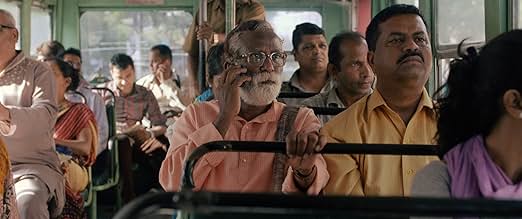
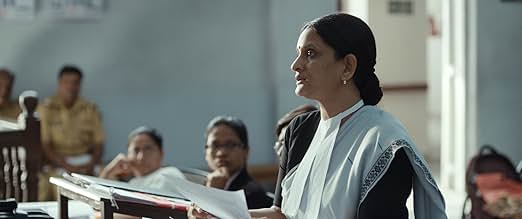
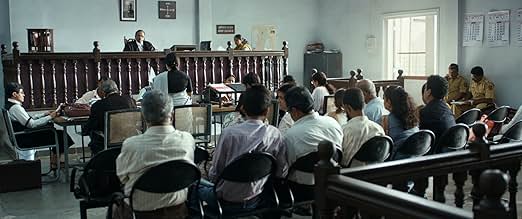
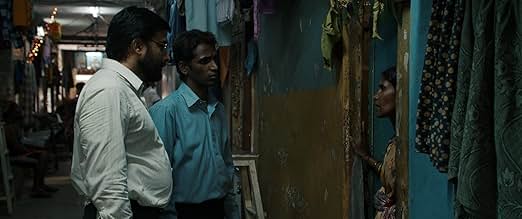
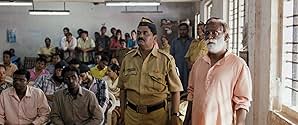












![Peepli [Live]](https://m.media-amazon.com/images/M/MV5BNDc1YTEwYmUtYTIxMC00Mjg4LWJmODctNGNiYjNjMTA3NjY5XkEyXkFqcGc@._V1_QL75_UY207_CR2)


